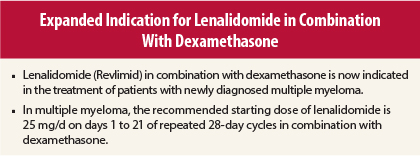In the Clinic provides overviews of novel oncology agents, addressing indications, mechanisms, administration recommendations, safety profiles, and other essential information needed for the appropriate clinical use of these drugs.
On February 18, 2015, the indication for lenalidomide (Revlimid) in combination with dexamethasone was expanded to include patients with newly diagnosed multiple myeloma.1 Lenalidomide in combination with dexamethasone was previously approved for use in patients with multiple myeloma who had received at least one prior treatment.
Supporting Trial
The expanded indication is based on findings in an open-label phase III trial in which 1,623 newly diagnosed patients who were not candidates for stem cell transplant were randomized to receive dexamethasone 40 mg/d (20 mg/d for age > 75 years) on days 1, 8, 15, and 22 of 28-day cycles plus lenalidomide 25 mg/d on days 1 to 21 of 28-day cycles either continuously until progressive disease (continuous group, n = 535) or for up to 18 cycles (18-cycle group, n = 541) or melphalan, prednisone, and thalidomide (MPT, n = 547).1,2 All patients received prophylactic anticoagulation, usually with aspirin. The primary endpoint was progression-free survival.
Overall, patients had a median age of 73 years (35% > 75 years); 59% had International Staging System stage I/II and 41% had stage III disease; 9% had severe renal impairment and 23% had moderate renal impairment; and Eastern Cooperative Oncology Group performance status was 0 in 29%, 1 in 49%, and 2 in 21%.
Median progression-free survival was significantly longer in the continuous lenalidomide group vs the MPT group (25.5 vs 21.2 months, hazard ratio [HR] = 0.72, P < .0001) as well as vs the 18-cycle lenalidomide group (20.7 months, HR = 0.70, 95% confidence interval [CI] = 0.60–0.82). No difference was observed between the 18-cycle lenalidomide group and the MPT group (HR = 1.03, 95% CI = 0.89–1.20). Overall response rates were 75.1% vs 62.3% and 73.4%. Median overall survival was 58.9 months with continuous lenalidomide vs 48.5 months with MPT (HR = 0.75, 95% CI = 0.62–0.90) and 56.7 months in the 18-cycle lenalidomide group (HR = 0.91, 95% CI = 0.75–1.09; HR = 0.83, 95% CI = 0.69–0.99, vs MPT).
How It Works
Lenalidomide is a thalidomide analog with immunomodulatory, antiangiogenic, and antineoplastic properties. It inhibits cell proliferation; induces apoptosis of certain hematopoietic tumor cells, including mantle cell lymphoma, multiple myeloma, and del (5q) myelodysplastic syndromes in vitro; and delays tumor growth in hematopoietic tumor models, including multiple myeloma. The immunomodulatory properties of the agent include activation of T cells and natural killer (NK) cells, increased numbers of NK T cells, and inhibition of proinflammatory cytokines (eg, tumor necrosis factor-α and interleukin 6) by monocytes. The combination of lenalidomide and dexamethasone synergizes the inhibition of cell proliferation and the induction of apoptosis in multiple myeloma cells.
How It Is Given
In multiple myeloma, the recommended starting dose of lenalidomide is 25 mg/d on days 1 to 21 of repeated 28-day cycles in combination with dexamethasone, with treatment continued until disease progression or unacceptable toxicity. In patients who are eligible for autologous stem cell transplantation, hematopoietic stem cell mobilization should occur within 4 cycles of lenalidomide-containing therapy. Starting doses should be 10 mg once daily for moderate renal impairment, 15 mg every 48 hours for severe renal impairment, and 5 mg once daily following dialysis in patients requiring dialysis.
Treatment should be interrupted in patients developing grade 3 or 4 thrombocytopenia or neutropenia, and complete blood cell counts should be followed weekly; upon recovery, treatment should be resumed at a lower dose. Treatment should be interrupted for other grade 3 or 4 adverse events and resumed at a lower dose upon resolution to grade ≤ 2.
Safety Profile
In the phase III trial in newly diagnosed myeloma, the most common adverse events of any grade in the continuous lenalidomide group included diarrhea (46%), anemia (44%), neutropenia (35%), fatigue (33%), and back pain (32%), and the most common grade 3 or 4 events were neutropenia (28%), anemia (18%), and pneumonia (11%). Infections were observed in 75% of patients in the continuous lenalidomide group vs 56% of patients in the MPT group.
In the continuous lenalidomide group, the most common adverse events leading to dose interruption were infections (29%), the most common adverse events leading to dose reduction were hematologic events (11%), and the most common adverse events leading to treatment discontinuation were infections (3.4%). In both lenalidomide groups, the frequency of adverse events was generally highest in the first 6 months of treatment, except with regard to cataracts; the frequency of cataracts increased from 0.7% during the first 6 months of treatment to 9.6% by the second year of treatment with continuous lenalidomide.
Lenalidomide carries boxed warnings for embryo-fetal toxicity, hematologic toxicity, and venous and arterial thromboembolism. To avoid embryo-fetal exposure, lenalidomide is available only through a restricted distribution program, the Revlimid REMSTM program, formerly known as the “RevAssist®” program (information available at www.celgeneriskmanagement.com or 1-888-423-5436).
Patients with del (5q) myelodysplastic syndromes should have complete blood cell counts monitored weekly for the first 8 weeks and monthly thereafter. A significantly increased risk of deep vein thrombosis and pulmonary embolism and a risk of myocardial infarction and stroke have been observed in patients with multiple myeloma; antithrombotic prophylaxis is recommended.
Lenalidomide also carries warnings/precautions for serious and fatal cardiac adverse events (observed in patients with chronic lymphocytic leukemia), second primary malignancies, hepatic failure including fatalities, allergic reactions including fatalities, tumor lysis syndrome including fatalities, tumor flare reactions (observed in chronic lymphocytic leukemia and lymphoma), and impaired stem cell mobilization.
Lenalidomide is contraindicated during pregnancy and in patients with demonstrated hypersensitivity to the agent. ■
References
1. Revlimid (lenalidomide) capsules prescribing information, Celgene Corporation, February 2015. Available at http://www.revlimid.com/wp-content/uploads/2013/11/PI.pdf. Accessed March 3, 2015.
2. Benboubker L, Dimopoulos MA, Dispenzieri A, et al: Lenalidomide and dexamethasone in transplant-ineligible patients with myeloma. N Engl J Med 371:906-917, 2014.


